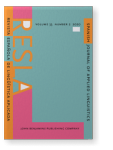Vol. 33:2 (2020) ► pp.588–617
Vol. 33:2 (2020) ► pp.588–617
A story-writing based study on the acquisition of aspect in Spanish by Mandarin Chinese learners
In this paper, we analyze the acquisition of Spanish past tense aspect by Mandarin Chinese learners of Spanish by means of three semi-guided writing tests. Specifically, we analyze the choice of pretérito indefinido and pretérito imperfecto, taking into account lexical aspect, grounding information, and the combination of both as variables. Moreover, we analyze whether transfer from Mandarin Chinese, the students’ first language (L1), occurs in the acquisition process. Our results partly support the Lexical Aspect Hypothesis (Andersen, 1991; Andersen & Shirai, 1996) and the Discourse Hypothesis (Bardovi-Harlig, 1994). According to these hypotheses, verbal properties and grounding information play a role in the selection of pretérito indefinido or pretérito imperfecto. Finally, our data support the existence of L1 transfer at the semantic level only.
Article outline
- 1.Introduction
- 2.Grounding information and the aspectual system in Spanish and Mandarin Chinese
- 2.1Lexical aspect
- 2.2Grammatical aspect
- 3.Related work on the acquisition of L2 aspect
- 4.Research questions and hypotheses
- 5.Methodology
- 5.1Participants
- 5.2Instruments
- 5.3Data analysis
- 6.Results
- 6.1Grounding information contrast
- 6.2Contrast between aspectual classes
- 6.3Grounding information and aspectual class parameters combined
- 6.4L1 transfer
- 7.Discussion and conclusions
- Notes
-
References
